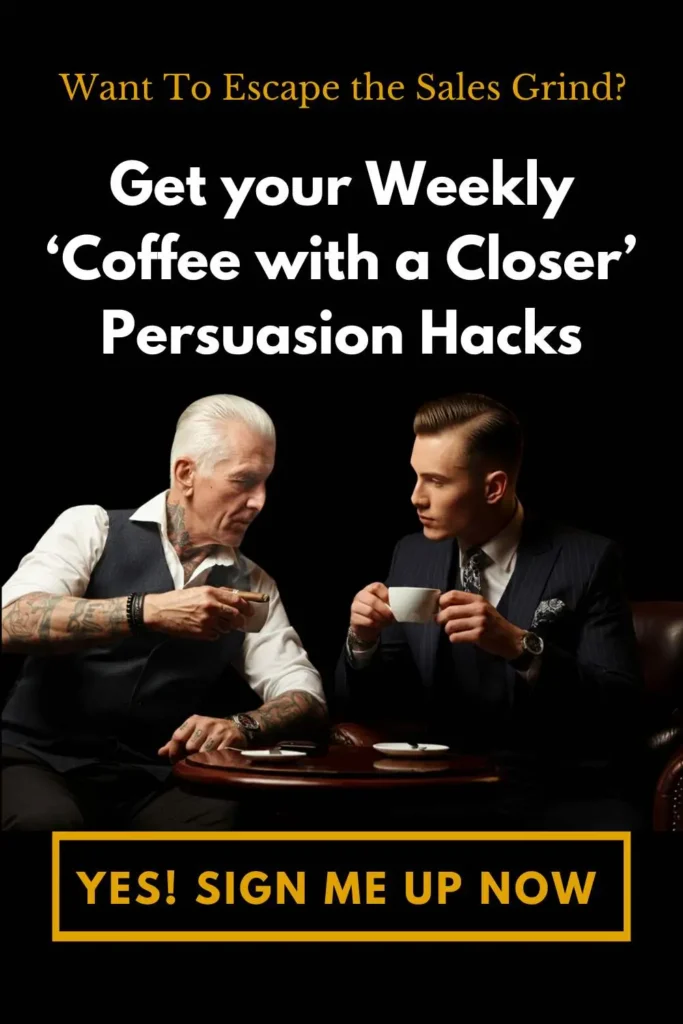The “You’re So Special” Effect (and How to Use It to Close Deals)
Alright, you charming charmers of the sales world, let’s talk about a little brain trick that can make your prospects feel like they’ve just won the lottery (and make them more likely to buy from you).
It’s the “You’re So Special” effect.
We all crave that feeling of being special, of being recognized and valued.
It’s a fundamental human need, deeply rooted in our psychology.
And as salespeople, we can leverage this desire to create stronger connections with our prospects and ultimately close more deals.
It’s not about flattery or manipulation; it’s about genuine appreciation and personalized attention.
Done with the endless sales theory and ready to actually close more deals? If you want to skip the ‘WHY’ and get straight to the ‘HOW’?
Make “Coffee with a Closer” your next move. Get weekly, battle-tested action steps delivered directly to your inbox – no fluff, just results.
The Biscuit Bonus: A Lesson in Psychology
A fascinating study involving waitresses and biscuits perfectly illustrates this principle.
When waitresses gave customers a few extra biscuits with their coffee, accompanied by a friendly comment like, “I like you guys, here are some extra treats,” their tips increased significantly!
This wasn’t about the monetary value of the biscuits; it was about the feeling of being singled out for special treatment.
The Study:
The study was conducted by Strohmetz et al. (2002) and published in the Journal of Applied Social Psychology. Here’s a breakdown of the experiment:
The Setup:
Waitresses at a restaurant were instructed to give some diners a small gift (a piece of candy) along with their check.
There were three experimental conditions:
- No Candy: The control group received no candy.
- One Candy: This group received one piece of candy per diner.
- Two Candies: This group received two pieces of candy per diner.
The Results:
The results were striking:
- No Candy: The average tip was 15.1%.
- One Candy: The average tip increased to 17.8%.
- Two Candies: The average tip jumped to 21.3%!
The Psychology of “Specialness”: Why It Works
The study demonstrates that it wasn’t simply the monetary value of the candy that influenced tipping behavior.
It was the psychological impact of the gesture:
Reciprocity:
The principle of reciprocity is a powerful social norm.
When someone does something nice for us, we feel obligated to reciprocate.
In this case, the unexpected gift of candy triggered a feeling of indebtedness, prompting diners to express their gratitude through a larger tip.
Surprise and Delight:
The unexpected gift created a positive surprise, disrupting the diners’ expectations and making them feel special.
This positive emotion enhanced their overall dining experience and influenced their tipping behavior.
Personalization:
The act of giving candy, especially with a friendly comment like, “I like you guys,” added a personal touch to the interaction.
It made the diners feel seen and appreciated as individuals, not just anonymous customers.
The Halo Effect:
The positive feelings generated by the unexpected gift and personalized attention may have created a “halo effect,” where the diners’ positive impression of the waitress influenced their perception of the overall service and the restaurant itself.
Implications for Sales:
This study has important implications for sales professionals:
Small Gestures, Big Impact:
Even small, unexpected gestures of kindness or appreciation can significantly influence a customer’s perception and behavior.
Personalization Matters:
Personalized attention and genuine appreciation can create a sense of connection and build rapport, making customers more receptive to your message.
The Power of Surprise:
Creating positive surprises can disrupt expectations and leave a lasting impression, enhancing the customer experience.
Reciprocity in Action:
By offering something of value, even something small, you can trigger the principle of reciprocity and increase the likelihood of a positive response.
Creating the VIP Experience: Practical Strategies
Here are some practical ways to make your prospects feel like VIPs:
Personalized Communication:
Use their name, mention specific details about their situation, and tailor your message to their needs. Avoid generic templates and mass emails.
Customized Solutions:
Don’t offer a one-size-fits-all approach. Take the time to understand their unique challenges and offer tailored solutions that address their specific needs.
Priority Service:
Offer expedited processing, priority access, or dedicated support to your best clients. Make them feel like they’re at the front of the line.
Direct Access:
Give your prospects your personal contact information and encourage them to reach out directly. This creates a sense of exclusivity and makes them feel valued.
Exclusive Offers:
Create special deals or promotions that are only available to a select group of customers. This triggers the “scarcity” principle and makes them feel like they’re part of an exclusive club.
“You Have to Make Buyers Feel Like They Won the Lottery
Tom Fox
Remember the Details:
Pay attention to the small details. Remember their preferences, their birthdays, or any personal information they’ve shared. These small gestures show that you care and value their relationship.
The “You’re So Special” Effect: Beyond Sales
The principle of making people feel special extends far beyond the sales world.
It’s a fundamental aspect of human interaction that can enhance relationships, build trust, and create a more positive and fulfilling life.
By practicing genuine appreciation and personalized attention, we can make a significant difference in the lives of those around us.
1. Ego Stroking and Self-Enhancement:
Our egos are inherently fragile.
We all have a deep-seated desire to feel good about ourselves, to see ourselves in a positive light.
When someone makes us feel special, it strokes our ego and reinforces our sense of self-worth.
This positive reinforcement creates a pleasurable feeling and makes us more inclined to like the person who provided that validation.
2. The Principle of Scarcity:
We tend to value things more highly when they are perceived as scarce or exclusive.
This is the principle of scarcity in action.
When we believe we are getting something that not everyone else has access to, it triggers a sense of exclusivity and makes us feel more important.
This applies to both tangible goods and intangible experiences, like special treatment or personalized attention.
3. Reciprocity and Social Exchange:
Humans are social creatures, and we are wired for reciprocity.
When someone does something nice for us, we feel an inherent obligation to return the favor.
This is the foundation of social exchange theory.
In a sales context, when a salesperson makes a prospect feel special, the prospect may feel more inclined to reciprocate by being more attentive, engaged, and ultimately, more likely to make a purchase.
4. The Power of Surprise:
Unexpected acts of kindness or special treatment can be incredibly powerful.
They disrupt our expectations and create a positive emotional surprise.
This surprise element amplifies the feeling of being special and makes the experience more memorable.
It’s like receiving an unexpected gift – it creates a sense of delight and appreciation.
5. Building Trust and Rapport:
Personalized attention and genuine appreciation go a long way in building trust and rapport.
When we take the time to understand a prospect’s needs and preferences, and then go the extra mile to make them feel valued, it creates a sense of connection and fosters a stronger relationship.
This trust and rapport can be crucial in overcoming objections and closing deals.
6. Cognitive Dissonance Reduction:
When people receive special treatment, it can create a sense of cognitive dissonance if they don’t feel they’ve “earned” it.
To reduce this dissonance, they may subconsciously justify the special treatment by becoming more invested in the relationship or the product being offered.
This can lead to a greater willingness to reciprocate and make a purchase.
7. The Halo Effect:
The halo effect is a cognitive bias where our overall impression of someone influences how we perceive their individual traits.
When we make a prospect feel special, it creates a positive halo effect that can extend to the product or service being offered.
The prospect may view the offering more favorably simply because of the positive association with the salesperson.
By understanding these psychological mechanisms, we can leverage the “You’re So Special” effect to create more meaningful connections with our prospects, build stronger relationships, and ultimately, increase our sales success.
Want to become a master of connection and learn how to apply the “You’re So Special” effect in your sales strategy? Sign up for the “Coffee with a Closer” and get expert guidance and actionable strategies to boost your sales success delivered straight to your inbox.
The “You’re So Special” Effect: Your Secret Weapon
By mastering the “You’re So Special” effect, you can transform your sales interactions from transactional to transformational.
You’ll build stronger relationships, create loyal customers, and close more deals (while making your prospects feel like rockstars in the process).
So, go out there and make your prospects feel like the only person in the room (even if you’re in a crowded conference hall).
Your sales numbers (and your ego) will thank you.

PS: Want the most powerful persuasion hacks delivered straight to your inbox? Sign up for the “Coffee with a Closer” today!


